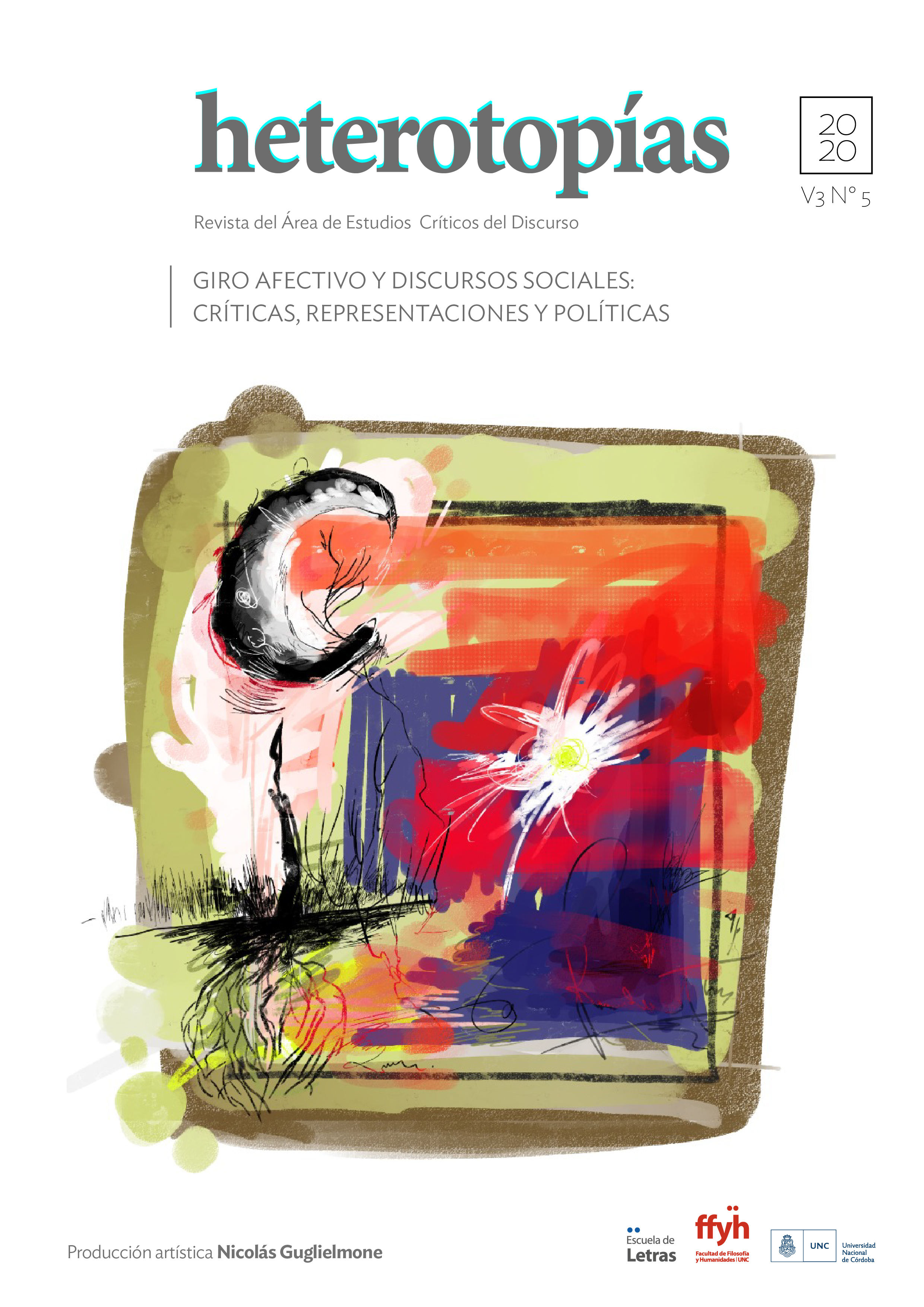Contranormative poetry and queer affectivity
Main Article Content
Abstract
The gesture of producing and reading poetry can be repairing: it is not only a question of its use as an expressive means outside the rules of syntactic coherence, but it also supposes the power to manifest the horizon of what is spoken, of enveloping the historical and the affective in a unique and transformative aesthetic.
The present work intends to study the dissident poetry of the cis-hetero-normativity as means of repairing and making visible the affections displaced from the social space. It pursues the objective of investigating the connection between the affective experience, the bodily experience and public life. To this end, an exhibition and analysis of queer poetry pieces is carried out (written by Perlongher, Silvestri, Lemebel, Susy Shock and Gómez Jattin), investigating the points in communion with those that Sara Ahmed has named “Queer Feelings”. From this key, the relationship between current social norms, the affects printed in poetry and its power to reconfigure the current social fabric is analyzed.
Downloads
Article Details

This work is licensed under a Creative Commons Attribution-NonCommercial-ShareAlike 4.0 International License.
Those authors who have publications with this journal, accept the following terms: Those authors who have publications with this journal, accept the following terms:
a. The authors will keep their copyright and guarantee to the journal the right of first publication of their work, which will be simultaneously subject to the Creative Commons Attribution - Non-Commercial - Share Alike (by-nc-sa) Attribution License; no commercial use of the original work or any derivative works is allowed, the distribution of which must be done with a license equal to the one that regulates the original work.
b. Authors may adopt other non-exclusive license agreements for the distribution of the published version of the work (e.g., deposit it in an institutional telematic archive or publish it in a monographic volume) provided that the initial publication in this journal is indicated.
c. Authors are allowed and recommended to disseminate their work through the Internet (e.g. in institutional telematic archives or on their website) before and during the submission process, which may lead to interesting exchanges and increase the number of citations of the published work. (See The effect of open access).
How to Cite
References
Ahmed, S. (2015). La política cultural de las emociones. México: UNAM.
Alí, L. y Domínguez, G. (2013). El giro afectivo. Athenea digital, 3(13), 101-119.
Amícola, J. (2009). Perlongher: Memoria, luto y melancolía. VII Congreso Internacional Orbis Tertius de Teoría y Crítica Literaria, 2009, La Plata. Estados de la cuestión: Actualidad de los estudios de teoría, crítica e historia literaria. Recuperado de http://www.memoria.fahce.unlp.edu.ar/trab_eventos/ev.3502/ev.3502.pdf.
Arboleda Ríos, P. (2010). ¿Ser o estar “queer” en Latinoamérica? El devenir emancipador en Lemebel, Perlongher y Arenas. Íconos, (39), 111-121.
Arfuch, L. (2015). El “giro afectivo”: emociones, subjetividad y política. DeSignis, (24), 245-254.
Bidegain, C. M. (2012). Susy Shock trans piradx: El inclasificable género colibrí. VIII Congreso Internacional de Teoría y Crítica Literaria Orbis Tertius, La Plata. Recuperado de
http://www.memoria.fahce.unlp.edu.ar/trab_eventos/ev.1576/ev.1576.pdf.
Bidegain, C. M. (2014). Yo, monstruo de mi deseo. Devenir trans en la escritura de Susy Shock. III Coloquio Internacional Escrituras del Yo, Rosario.
Borbón, J. S. (2013). Néstor Perlongher: estrategia para una sensibilidad menor. Buenos Aires: Facultad de Filosofía y Letras de la Universidad de Buenos Aires.
Butler, J. (2004). Violencia, duelo, política. En Vida precaria: el poder del duelo y la violencia. Buenos Aires: Paidós.
Damasio, A. (2003). En busca de Spinoza: neurobiología de la emoción y los sentimientos. Barcelona: Crítica.
Ferrer Ruiz, G. A. (2006). Poética e identidad en Raúl Gómez Jattin. Cuadernos de literatura del Caribe e hispanoamericana, 3, 201-226.
Freud, S. (1993 [1914 - 1916]). Duelo y melancolía. En Obras Completas XIV. Buenos Aires: Amorrortu.
Lemebel, P. (2009). Loco afán: crónicas de sidario. Barcelona: Seix Barral.
Macón, C. (2015). Giro afectivo y reparación testimonial: El caso de la violencia sexual en los juicios por crímenes de lesa humanidad. Mora, 21, 63-87.
Manada de lobas (2016). Foucault para encapuchadas. Buenos Aires: Queen Ludd.
Manrique, C. (2012). La palabra transgresiva y la otra vida: de la literatura al gesto cínico (entre Foucault y Raúl Gómez Jattin). Revista de estudios sociales, 43, 23-35.
Memoria Chilena (2018). Pedro Lemebel (1952-2015) - Memoria Chilena. Recuperado de: http://www.memoriachilena.gob.cl/602/w3-article-3651.html.
Perlongher, N. (1997). Poemas completos. Buenos Aires: Seix Barral.
Sabo, M. J. (2014). Un Camp desde el margen: El cuerpo mestizo de Latinoamérica en la crónica de Pedro Lemebel. RECIAL Revista del CIFFyH Área Letras, V(5). Recuperado de https://revistas.unc.edu.ar/index.php/recial/article/view/9612.
Sedgwick, E. (2003). Tocar la fibra: afecto, pedagogía, performatividad. Madrid: Alpuerto.
Solana, M. (2016). Reflexiones sobre el giro afectivo en la historia queer. Mora, (22), 135-150.
Susy Shock (2010). Beso [Entrada en blog]. Recuperado de http://susyshock.blogspot.com/2010/07/beso.html.
Sutherland, J. P. (Ed.). (2001). A corazón abierto: geografía literaria de la homosexualidad en Chile. Santiago de Chile: Editorial Sudamericana.
Zambrano, J. (Comp.). (2012). Versos Di-versos. Venezuela: de Caribe C.A.
